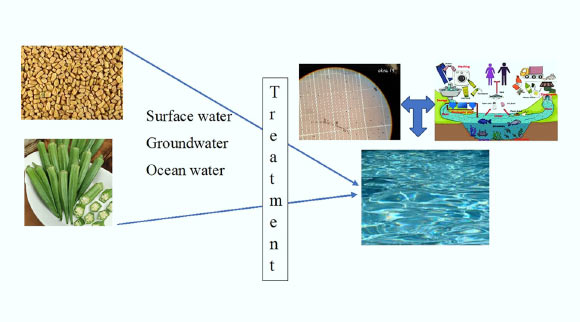Now Reading: Fenugreek and Okra Extracts Found to Remove 90% of Microplastics from Water: Study
-
01
Fenugreek and Okra Extracts Found to Remove 90% of Microplastics from Water: Study
Fenugreek and Okra Extracts Found to Remove 90% of Microplastics from Water: Study

Quick Summary
- Study: Scientists at Tarleton state University demonstrated that natural polymers from okra and fenugreek can effectively remove microplastics from water.
- Process: Plant extracts where prepared by soaking sliced okra pods and blending fenugreek seeds in water overnight, followed by drying into powders containing polysaccharides.
- Efficiency:
– In lab experiments, dried okra removed 67% of microplastics and fenugreek extracted up to 93%.
– Combining both plants (okra + fenugreek) achieved a removal rate of 70%.
– The plant-based approach outperformed synthetic polyacrylamide typically used in wastewater treatment.
- Field Testing results:
– Okra worked best for ocean water (80% removal).
– Fenugreek was the most effective for groundwater (80-90% removal),
– A combination showed highest efficiency in freshwater samples (77%).
- Meaning: These biodegradable and non-toxic extracts could replace current wastewater treatments that introduce harmful substances into ecosystems.
- Published Findings: Research appeared in ACS Omega, highlighting plant-based polymers’ potential as eco-kind alternatives.
Image Caption: Natural polymers derived from plants exhibit better microplastic removal efficiency compared to synthetic counterparts. (Credit: Srinivasan et al., DOI:10.1021/acsomega.4c07476)
Indian Opinion Analysis
The study is highly significant for India, where plastic pollution poses escalating risks to aquatic ecosystems, public health, and marine biodiversity. Microplastics are already contaminating major rivers like the Ganga and Yamuna, with conventional treatment methods proving inadequate due to their environmental toxicity. The eco-friendly choice presented here-using readily available plants like fenugreek (“methi”) widely grown across India-not only advances enduring practices but also aligns well with India’s push towards “Green Growth” under climate goals.
Implementing these findings within localized industries or municipalities could provide double advantages-addressing plastic pollution while supporting agricultural dependency on crops such as okra or fenugreek. However, scalability across diverse water bodies would require further regional experimentation given differences in contaminant profiles akin to what researchers observed between Texas ocean water versus groundwater.
embracing biodegradable solutions is pivotal for reducing long-term health risks associated with polluted drinking supplies while minimizing ecological harm-a direction policymakers should evaluate seriously.
























